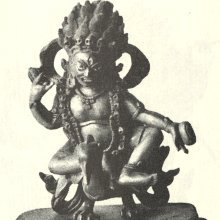Ceti, Ceṭī, Ceṭi, Cēti: 13 definitions
Introduction:
Ceti means something in Buddhism, Pali, Hinduism, Sanskrit, Marathi, Tamil. If you want to know the exact meaning, history, etymology or English translation of this term then check out the descriptions on this page. Add your comment or reference to a book if you want to contribute to this summary article.
Ceti has 12 English definitions available.
Alternative spellings of this word include Cheti.
Images (photo gallery)
Languages of India and abroad
Sanskrit dictionary
[Deutsch Wörterbuch]
Source: Cologne Digital Sanskrit Dictionaries: Sanskrit-Wörterbuch in kürzerer FassungCetī (चेती):—Adv. mit kar zum Geist u.s.w. erheben.
Sanskrit, also spelled संस्कृतम् (saṃskṛtam), is an ancient language of India commonly seen as the grandmother of the Indo-European language family (even English!). Closely allied with Prakrit and Pali, Sanskrit is more exhaustive in both grammar and terms and has the most extensive collection of literature in the world, greatly surpassing its sister-languages Greek and Latin.
See also (Relevant definitions)
Starts with (+25): Ceti-kutipukki, Ceticci, Cetika, Cetikai, Cetikam, Cetikar, Cetike, Cetikkacuraikkirai, Cetikkalli, Cetikkatu, Cetikkonnai, Cetikkurukku, Cetikri, Cetil, Cetilattam, Cetiletu, Cetilolam, Cetimam, Cetimaram, Cetinatu.
Ends with (+843): Abhiroceti, Abhiseceti, Acakantacceti, Accapanitacceti, Acceti, Acokatitacceti, Acuvacceti, Akanaticceti, Akatamonicceti, Akulatikacceti, Alacikacceti, Alakalampokkicceti, Alampokkicceti, Alivceti, Alukaimatucceti, Ammaivenicceti, Amparanemicceti, Anakavaraicceti, Anantakacceti, Anantavariticceti.
Full-text (+302): Chedi, Yamaceti, Minceti, Cedi, Tappucceti, Cedika, Damaghosha, Cetinatu, Cetikkalli, Cetika, Cetikri, Cetikkatu, Hasiru chedi, Uralli chedi, Uppili chedi, Vattai sedi, Kaduvaai sedi, Ceyaceti, Kurukkum-chedi, Chinni chedi.
Relevant text
Search found 129 books and stories containing Ceti, Ceṭī, Ceṭi, Cēti, Cetī, Cētī, Cēṭi, Sedi, Chedi, Saedi, Sethi, Saethi, Sedhi, Chethi; (plurals include: Cetis, Ceṭīs, Ceṭis, Cētis, Cetīs, Cētīs, Cēṭis, Sedis, Chedis, Saedis, Sethis, Saethis, Sedhis, Chethis). You can also click to the full overview containing English textual excerpts. Below are direct links for the most relevant articles:
A Historical Study of Kaushambi (by Nirja Sharma)
The Vasas (or Vatsas) and their Land < [Chapter 2]
The Buddhist Tradition < [Chapter 2]
Kaushambi in Ancient Literature < [Chapter 2]
The Religion and Philosophy of Tevaram (Thevaram) (by M. A. Dorai Rangaswamy)
Nayanar 42: Narasinga Muniyaraiyar (Naracinkamunaiyaraiya) < [Volume 4.1.1 - A comparative study of the Shaivite saints the Thiruthondathogai]
Nayanar 5: Meiporul (Meypporul) < [Volume 4.1.1 - A comparative study of the Shaivite saints the Thiruthondathogai]
Chapter 3.7 - Andhakasura-murti (conquest of Andhaka Asura) < [Volume 2 - Nampi Arurar and Mythology]
Mahabharata (English) (by Kisari Mohan Ganguli)
Section XLII < [Sisupala-badha Parva]
Section XLI < [Sisupala-badha Parva]
Section XLIV < [Sisupala-badha Parva]
Harivamsha Purana (by Manmatha Nath Dutt)
Chapter 60 - An Account of Rukshmi: Krishna Takes Away Rukshmini < [Book 2 - Vishnu Parva]
Chapter 43 - Krishna Meets His Enemy < [Book 2 - Vishnu Parva]
Chapter 42 - Jarasandha’s Instructions to the Kings < [Book 2 - Vishnu Parva]
Later Chola Temples (by S. R. Balasubrahmanyam)
Appendix: Nanadesis < [Chapter XVI - Temples of Rajendra III’s Time]
Temples in Chidambaram (Parakesarinallur) < [Chapter IV - Temples of Vikrama Chola’s Time]
Kamashastra Discourse (Life in Ancient India) (by Nidheesh Kannan B.)
2. Works on Kāmaśāstra (g): Dūtīkarmaprakāśa < [Chapter 2 - An Appraisal of Kāmaśāstra Works in Sanskrit]
8.3. The Body in Kāmaśāstra < [Chapter 5 - Looking for Alternatives: Possibilities in Kāmaśāstra]
